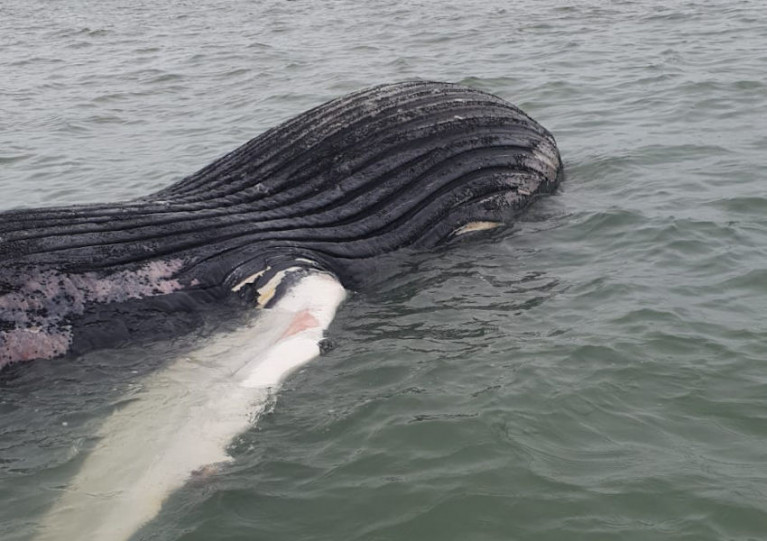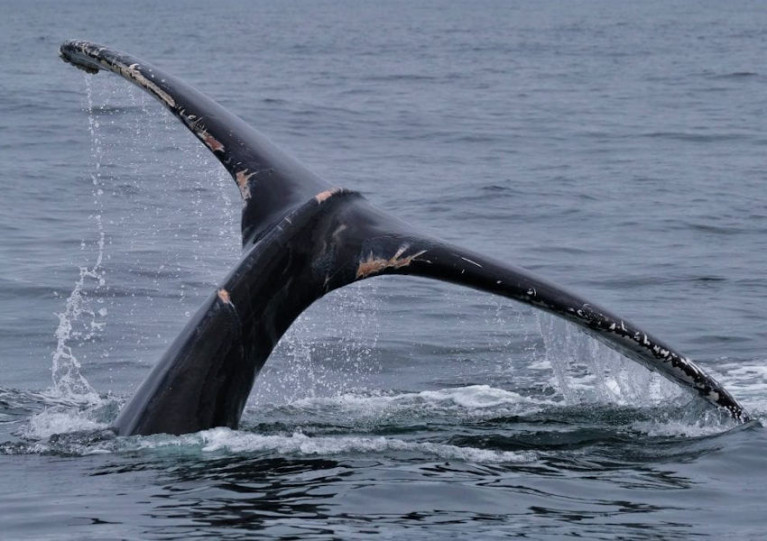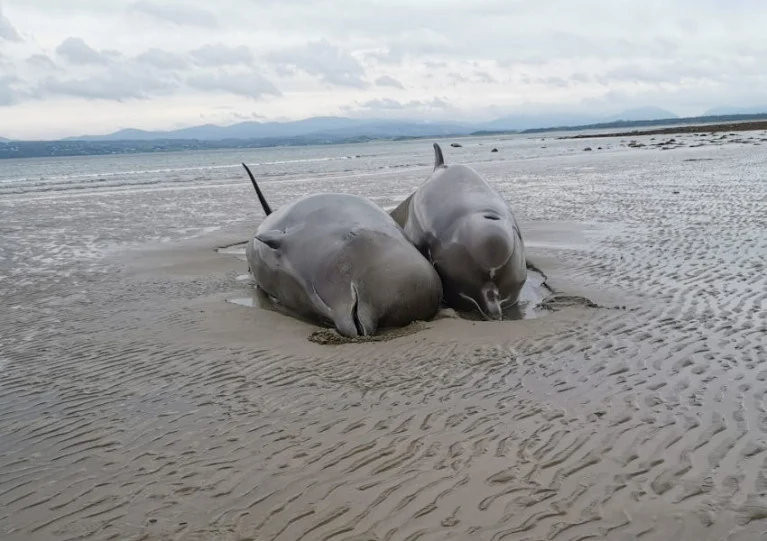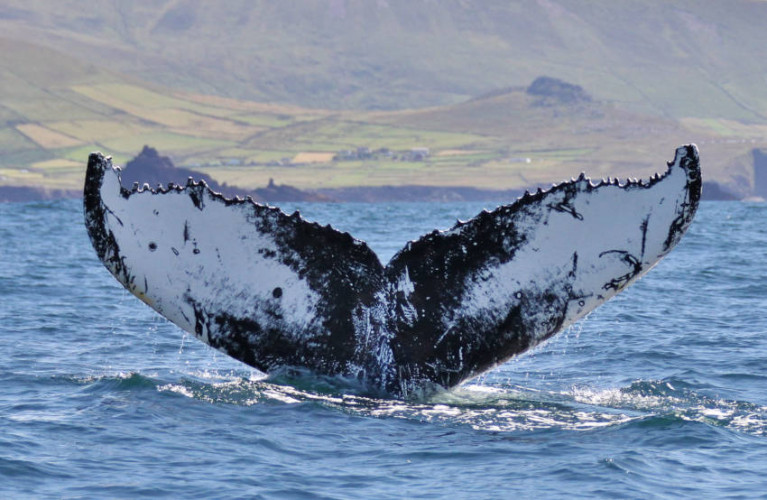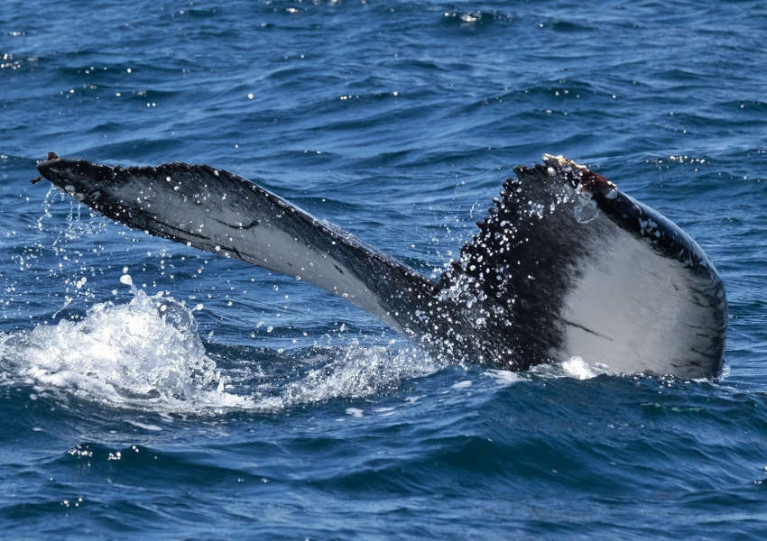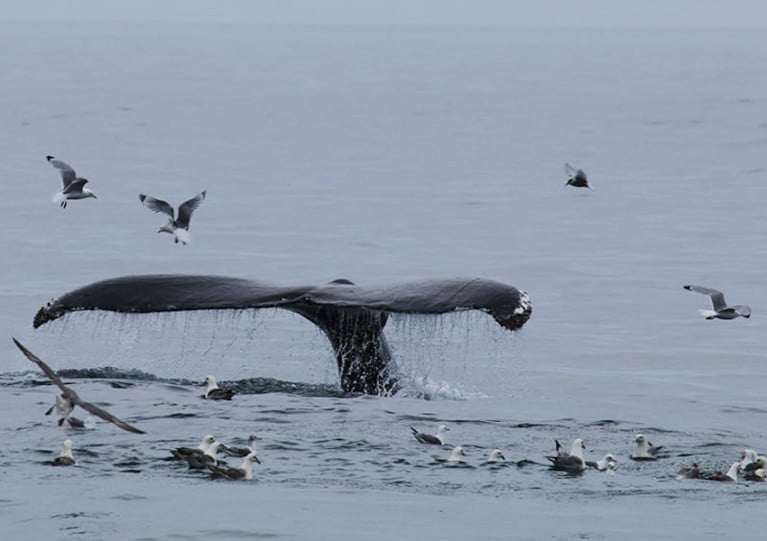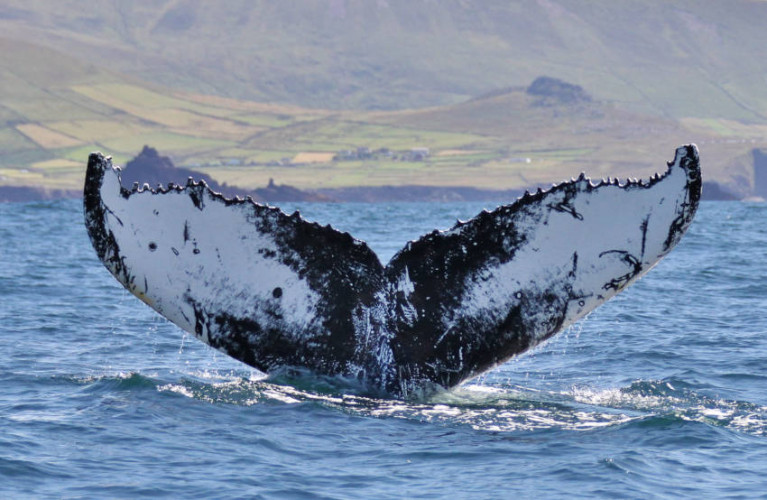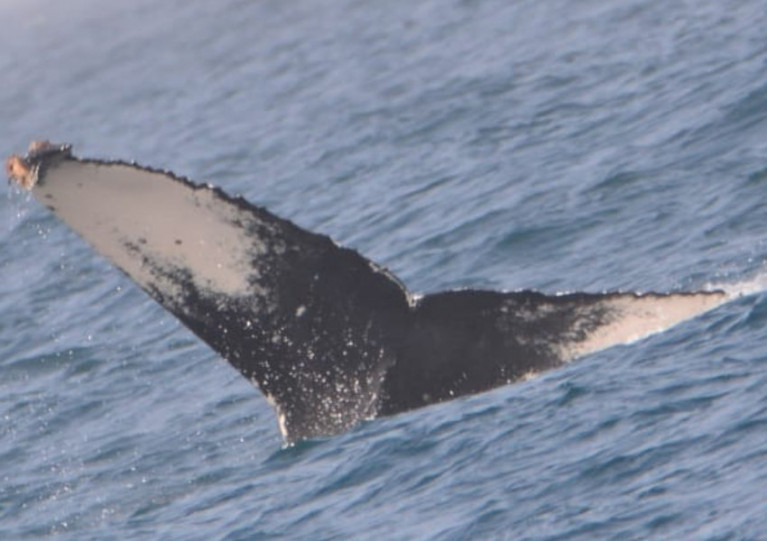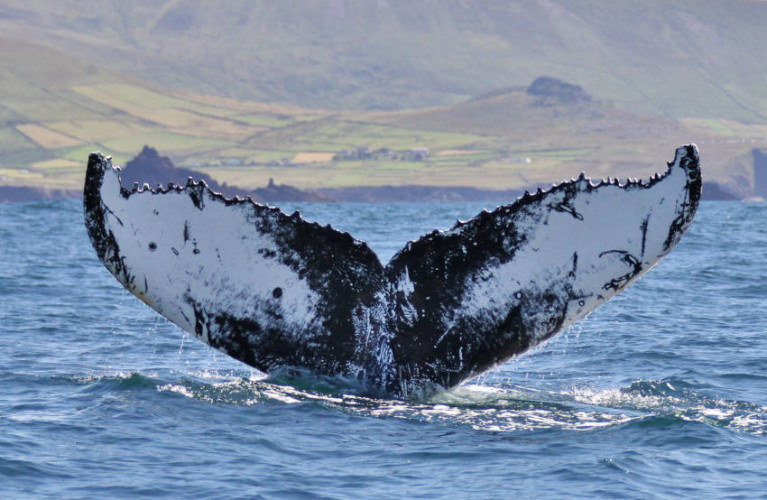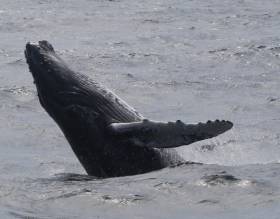Displaying items by tag: humpback whales
Humpback Whale Washed Up in West Cork Is Dead Juvenile, IWDG Says
The carcass of a juvenile humpback whale washed ashore in West Cork is only the ninth such stranding of the species in Ireland, according to the Irish Whale and Dolphin Group (IWDG).
Sightings officer Pádraig Whooley confirmed from images of the marine wildlife specimen captured in Roaringwater Bay yesterday (Wednesday 24 February) that it was a juvenile male not previously recorded in Irish waters.
Such young whales are not unexpected close to our shores at this time of year, when adults of breeding age are either en route to or already at lower-latitude breeding sites such as Cabo Verde off West Africa.
“This is something that some young humpbacks can opt out of, as it’s a long track south to places like the Cabo Verde and with no hope of successfully breeding there is nothing much in it for them,” Whooley explains.
“So a cohort of young, independent humpbacks seem content to over winter at higher latitudes, where there is, or should be, plenty of food for them.”
In this case, however, Whooley says: “The images we’ve received so far suggest it is in rather thin condition and so it may not have fed for some time.
“There are no obvious signs of rope marks or net damage that may suggest entanglement in fishing gear, something that slow-swimming humpbacks that remain inshore are prone to. And there are no large traumas to suggest ship-strike. So as is so often the case, the circumstances underpinning this stranding are unclear.
“IWDG hope in the coming days to visit the site to take detailed measurements and get skin and blubber samples which can be used for genetics, contaminants and stable isotope analyses.”
Whooley adds that the IWDG is in liaison with the National Parks and Wildlife Service (NPWS) regarding examination of the carcass and its disposal, but suggests that because of its remote location “there is no strong case for removal”.
The Irish Whale and Dolphin Group (IWDG) says it has recently documented evidence of a humpback whale scarred by entanglement in fishing gear in Irish waters.
Humpback IRL#HB43 was photographed in Dingle Bay on Sunday 11 October by IWDG member Nick Massett, who noted in his images some significant scarring on its tail fluke that was not present when the same whale was spotted off West Kerry two months prior.
The charity says this scarring is consistent with entanglement — and it’s believed, based on the marine wildlife giant’s known movements between August and this month, that the lesions were sustained off West Kerry.
Humpback whales regularly feed in Ireland’s inshore waters during the summer and autumn. But this activity also brings the whales into close proximity with active fisheries.
“It’s likely this animal got caught in the rising rope of a marker buoy to a string of lobster pots, or gill net,” Massett says.
Entanglement in fishing gear is an issue of emerging concern to the IWDG, which is working with Dr Charla Basran at the University of Iceland’s Husavik Research Centre to quantify the rate of entanglement of humpback whales in Irish waters.
Dr Basran recently published work showing that 24.8% of 379 individual humpback whales photographed in Iceland presented wrapping injuries and notches known to be indicative of entanglement.
Ireland shares a whale population with Iceland, and the IWDG says will be interesting to quantify the rate of these lesions on whales photographed in Ireland — and potentially reveal where along their journey to the North Atlantic from their southern breeding grounds they pick up their wounds.
The IWDG is planning a workshop on the issue supported by knife-maker Spyderco, which has provided knives customised for cutting ropes from live whales.
No Sign Of One Animal From Deadly Bottlenose Whale Stranding
One of the victims of a deadly mass stranding of bottlenose whales in Donegal last week has not reappeared, according to Highland Radio.
Seven of the marine mammals died in the biggest mass stranding of its kind on record in Ireland, as previously reported on Afloat.ie.
The eighth whale was refloated in the shallows when the tide came in, and hopes were that it would make to back to deeper waters on its own. However it was confirmed to have died the following morning, Thursdasy 20 August.
Local volunteers with the Irish Whale and Dolphin Group (IWDG) have appealed for the public to report any possible sightings, as they are keen to get samples which might reveal more details about the whale pod and its sudden demise.
Elsewhere, rare video has been captured of the humpback whale known as ‘Boomerang’ off West Cork, as RTÉ News reports.
The whale is the third humpback in the IWDG’s records. It was first identified in 2001 thanks to its unique dorsal fin, and has returned to feed in Irish waters regularly over the last two decades.
This story was updated on Monday 31 August to correct details about the refloated bottlenose whale, which was not presumed to have survived as the previous version stated.
Humpback Whales In ’Feeding Frenzy’ Off Dingle Peninsula
Whale watchers off the Kerry coast have been gifted a treat with a “feeding frenzy” of humpback whales near the Dingle Peninsula, as RTÉ News reports.
As many as 12 of the marine wildlife giants have spent more than a week chasing sprat shoals even in inshore waters — providing a rare opportunity to see them from land.
And the number includes the latest addition to the Irish Whale and Dolphin Group’s records: a juvenile that’s the 107th individual humpback in Irish books since 1999.
But the approach of Storm Ellen later today (Wednesday 19 August) means any prospective whale spotters will have to put off their plans as Status Red conditions loom.
The Irish Whale and Dolphin Group has celebrated a milestone with the confirmation of the 100th and 101st individual humpback whales in its catalogue of Ireland’s waters.
The sightings were made last Monday 20 July by Nick Massett in outer Dingle Bay — and reflect just how far the IWDG has come with its marine wildlife monitoring project, says IWDG sightings officer Pádraig Whooley.
Proper records first began in September 1999 with just three humpbacks spotted off the Kinsale Gas Fields in West Cork, and averaged fewer than one a year until the end of the Noughties, when the record totalled 12.
Humpback whale sightings became more numerous and West Cork it seemed no longer had a monopoly
“Then during the second decade, there was a change,” Whooley said.
“Humpback whale sightings became more numerous and West Cork it seemed no longer had a monopoly on the Big Winged New Englander, as individuals starting showing up as far east as Hook Head and Curracloe in Co Wexford.
“But there was always a sense that these were outliers; the real range expansion was further west off the Slea Head Peninsula, Co Kerry.
“During the second half of the decade it seemed fairly evenly split between the West Cork and West Kerry hotspots.
“That was until 2015 when something changed in the northeast Atlantic and in this year alone we doubled the numbers of animals on the catalogue from 33 to 66, with most of these showing up in West Kerry and almost all of them being new animals, never previously documented in Irish waters.”
This was also when the international research community began to take notice, especially since Irish sightings “were coming from an area where previously few humpbacks had been recorded”, Whooley said.
A remarkable leap for the humpback whale as it reaches an important milestone in Irish waters ? ? pic.twitter.com/fpSIBfhHE0
— RTÉ News (@rtenews) July 27, 2020
“We started off 2020 with 97 individually recognisable humpback whales, and it was always likely to be a big year for the catalogue, even with Covid.”
He added: “To have reached 100 by 2020, although not quite exponential, it is remarkable and surely mirrors the global recovery of this most iconic species.”
And the latest additions to the catalogue are not the only cause for celebration, as the IWDG have also made their third Irish match to the Cape Verde breeding grounds — the second this year after Ireland’s long-suspected link to the waters off West Africa was confirmed a year ago.
“It’s a great story and one IWDG look forward to sharing with you over the next 21 years,” Whooley said. “It seems humpback whales have an endless capacity to inspire both whale watchers and whale researchers alike.”
Documentary On Irish Mission To Find Humpback Whales In Arctic Circle Now Streaming Online
A new hour-long documentary following the Irish Whale and Dolphin Group (IWDG) on a unique research expedition to the Arctic Circle is now available to rent and watch on demand.
On The Trail Of The Humpback Whale tells the story of the IWDG’s weeks-long passage to Iceland two years ago in search of humpback whales, building links with the country and its people among the way.
Tony Whelan of Canola Pictures — which also produced The Humpback Whales of Cape Verde — was along for the voyage, documenting the team’s encounters with local people and marine wildlife alike.
The IWDG previously brought the story of their adventure on a nationwide tour — and now it can be enjoyed at home on your choice of computer, tablet, smartphone or streaming box.
Kerry Is The Kingdom For Humpback Whale Sightings
Nearly half of all humpback whales identified in Irish waters have been spotted off the coast of Co Kerry.
That’s according to new figures from the Irish Whale and Dolphin Group (IWDG), which also reveal that nearly 100 of the marine wildlife giants have been individually catalogued over the past 20 years — many of them return visitors.
IWDG chief executive Dr Simon Berrow tells the Irish Mirror that ‘citizen science’ contributions in the form of photos of cetaceans spotted offshore have been key to developing its catalogue of confirmed sightings.
“For someone to go out and find the whale, photograph the whale, recognise the whale and then go out and do it again a second or third time in the same season and give the information to us, is phenomenal,” he says.
Kerry leads the way for humpback whale sightings, accounting for almost half (46%) of the total.
But neighbouring Cork, at 42%, isn’t much further behind — and Waterford, Wexford, Galway and Clare also present good sighting opportunities.
The Irish Mirror has more on the story HERE.
Despite desktop research replacing field work during the ongoing Covid-19 pandemic, the Irish Whale and Dolphin Group recently made a breakthrough in confirming a second Irish humpback whale at breeding grounds off Cape Verde — following last year’s confirmation of what was long suspected by researchers.
The match with HBIRL78 — first sighted off Hook Head in January 2017 — was made in collaboration with Lindsey Jones of the North Atlantic Humpback Whale Catalogue and “suggests we were right to invest our time and energy into this archipelago”, writes IWDG sightings officer Pádraig Whooley.
Although there is little chance of any further trips this breeding season, with Cape Verde having shut down like much of the world to control the spread of the virus, the latest find will be encouraging when field work can resume in 2021.
“HBIRL78 may still be in the waters of Sal Rei Bay, Boa Vista, looking to mate or give birth, and if this is the case, it still has a long 4,250 km northbound journey ahead of it,” says Whooley. “It could of course have completed it’s reproductive mission, in which case it may be little more than a few weeks away from finding itself within scoping range of our southwest headlands.
“Whether of course we’ll be able to get out on boats to photograph it when it does return will be down to a much smaller and far less welcome organism. But given the current Covid-19 environment, I can think of nothing better for body, soul or mind, than to sit on a headland for a few hours and try to spot our returning humpbacks.”
The Irish Whale and Dolphin Group (IWDG) is seeking a new sponsor for its “pioneering” WhaleTrack Ireland project.
Previously backed by Ryanair, WhaleTrack Ireland seeks to understand how the large marine wildlife — especially humpback whales — are using Irish waters, largely through citizen science.
During the last 12 months, the IWDG says it has increased its work raising awareness of humpback whales “to unprecedented levels in Ireland”.
This includes the first ever confirmation of breeding grounds in Cape Verde for whales that frequent Irish shores.
“In order to continue this important work the IWDG need a new sponsor,” the group says.
“We have significant capital equipment purchased under the Ryanair sponsorship but require funds to support fieldwork and maintain our photo ID catalogues and provide support to our citizen scientists.
“This work supports the development of marine tourism in Ireland and greatly enhances the opportunities to go and see these magnificent creatures as well as ensuring their long-term conservation.
“The IWDG estimates that this costs around €40,000 per annum to maintain our current level of activity.”
Prospective sponsors, or those who could connect the group with same, are encouraged to get in touch with the IWDG at [email protected].
IWDG Sets Sail For Cape Verde This Weekend On Latest Humpback Whale Research Mission
The Irish Whale and Dolphin Group (IWDG) sets sail this weekend for Cape Verde next month on its eighth humpback whale expedition.
Funded by the Island Foundation, this two-week mission comes just months after the IWDG finally confirmed the breeding grounds for Ireland’s regular humpback whale visitors near the west African island chain.
Cape Verde also appears to be a chosen spot for these marine wildlife giants from both ends of the earth, as a previous mission in September 2014 recorded humpbacks that usually feed in the southern hemisphere.
Next month’s mission, while building on this research, will also involve training local marine biologists in cetacean survey and research techniques “to empower them to take ownership of whale and dolphin conservation”.
Spanish research group Edmaktub will be providing its 47ft Lipari catamaran as a research platform for their work, updates from which will be posted to a dedicated Facebook page.



























